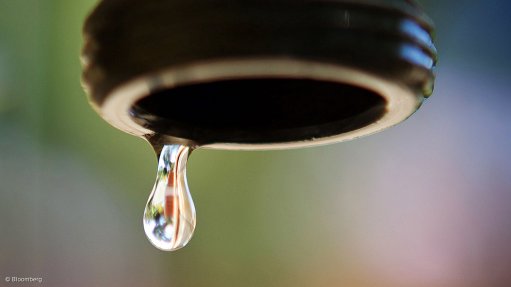
Photo by: Bloomberg
The new City of Johannesburg Environment, Infrastructure and Service Delivery MMC Mpho Sesedinyane says he needs to be briefed by Johannesburg Water so he can lay out his plans to combat water issues in the city.
Sesedinyane, who was sworn in on Monday, faces the huge task of dealing with two of the most beleaguered and most important entities – electricity and water.
Sesedinyane took over from Michael Sun, who left office on 30 September when Mpho Phalatse was ousted as mayor in a motion of no confidence.
Dada Morero replaced Phalatse and announced his mayoral committee on Monday.
Speaking to News24 after a meeting with Eldorado Park residents, Sesedinyane said his first task would be to meet with the respective entities responsible for water services in the city.
Johannesburg Water purchases water from bulk supplier Rand Water and distributes it to the city.
Last week, a heat wave highlighted issues with the supply of water to the city and several low-lying areas were without water for several days. This included two of the biggest public hospitals in Johannesburg – Rahima Moosa Mother and Child Hospital in Coronationville, and Helen Joseph Hospital in Auckland Park.
Many of these areas are still without water.
This is despite the dams supplying the Integrated Vaal River System – which provides Johannesburg with water – being collectively 93.8% full.
Water experts Anthony Turton and Ayesha Laher explained that the issue was caused by a collection of failures.
Rand Water has throttled its supply by 30% with Stage 2 water restrictions.
The heatwave caused the consumption of water to increase.
Load-shedding has prevented pumps from filling reservoirs which empty before they can be filled.
Water reticulation from reservoirs is old and broken and lose more than 38% of the water before it gets to residences.
Reservoirs have not been built fast enough to accommodate the growing population.
The precarious balance of delivery versus supply needs just one of these issues to stop the supply of water to residents.
Last Tuesday, Rand Water increased water restrictions as its storage capacity decreased from 52% to 38%. The restrictions are aimed at getting storage back to a safe 60% capacity.
Sesedinyane said "unlike electricity, there is no alternative source" of water.
"We (the City of Johannesburg and Johannesburg Water) need to meet so we can see what immediate solutions we can make and what we can do in the longer term.
"Residents need to give me a little bit of time, so I can ultimately come up with a solution."
He said the same plan would be implemented for the electricity crisis, which led to Stage 6 load-shedding last month.
Asked what could be done to ensure party politics did not hamper fixing the infrastructure, Sesedinyane said: "It's important, in current politics, that there must be proper planning and communication and a sense of respect of all the other parties (in the multiparty government).
"As the ANC, we can ensure we stay [as leaders of the multiparty government] by delivering services to the people in Johannesburg."
He said once people saw that services were being delivered, the government in the city would be stable.